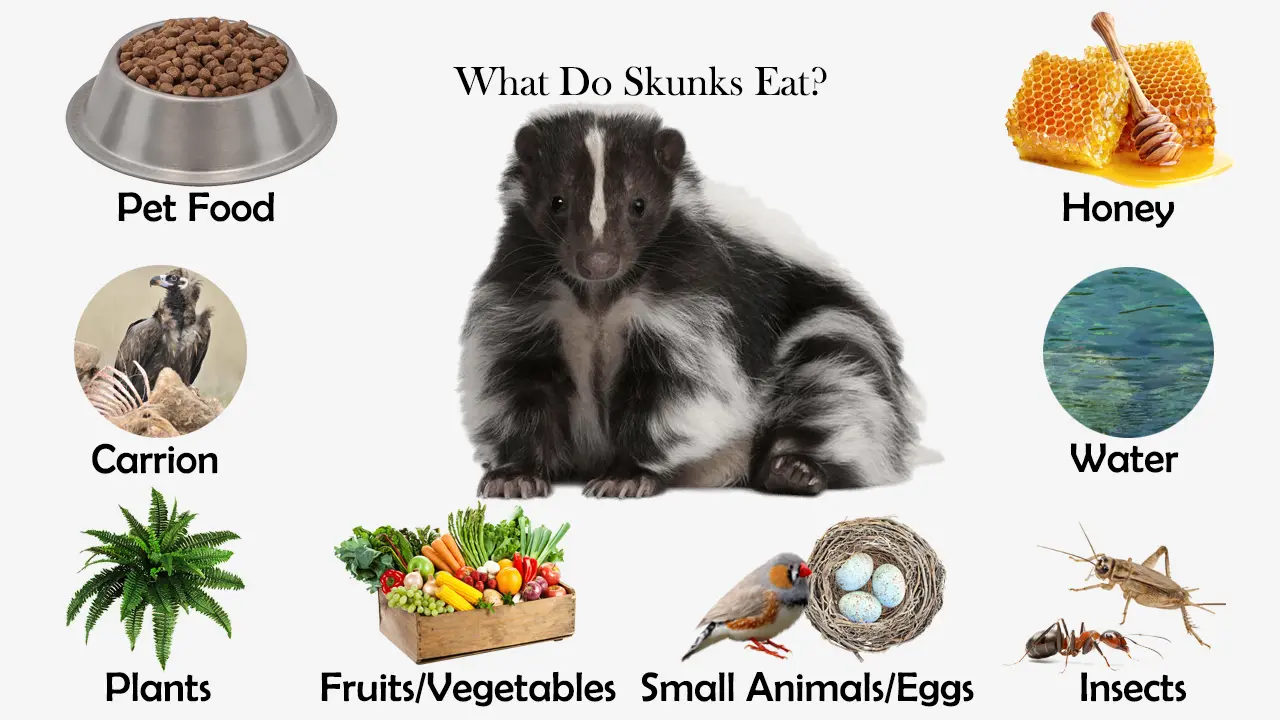Skunks are opportunistic eaters in the wild, known for their nocturnal feeding habits. These adaptable creatures consume a wide range of foods, including fish, plants, insects, and more. However, when kept as exotic pets, they require a carefully balanced and well-rounded diet to maintain optimal health. It's important to note that skunks are prone to overeating, which can lead to obesity—a common problem for skunk owners.

| Food Category | Examples |
|---|---|
| Protein Sources | Fish, chicken, eggs, insects, beans |
| Vegetables | Carrots, peas, squash, corn, leafy greens |
| Fruits | Berries, pears, bananas, apples |
| Carbohydrates | Whole grain bread, oatmeal, sweet potatoes, pasta, rice |
Skunks thrive on diets that are high in protein, with lean proteins like fish and chicken being ideal choices. Along with fresh fruits and vegetables, a balanced diet includes carbohydrates from whole grains such as oatmeal, sweet potatoes, and rice.
In zoo environments, skunks are often fed commercial insectivore, omnivore, or carnivore diets. These products are specially formulated for animals like skunks, and some owners opt to buy them in bulk and freeze them for convenience. However, dog food can also be included in a skunk's diet, particularly in small amounts. Dry dog food can help prevent tartar buildup on their teeth and keep their gums healthy.
It's crucial to avoid processed foods, as skunks have trouble digesting them. Stick to fresh foods for your pet skunk to ensure they stay healthy and active.
Skunks are prone to obesity, especially in a captive environment. A sedentary lifestyle, combined with overeating, can lead to excessive weight gain and associated health issues like fatty liver disease. To help your skunk maintain a healthy weight, it’s important to monitor their portion sizes and ensure they get enough exercise. Regular physical activity, such as playing or exploring in a safe, pesticide-free environment, is essential for keeping them fit.
Skunks are vulnerable to heart disease, which can sometimes be triggered by insufficient levels of carnitine or the amino acid taurine in their diets. To support heart health, include strong sources of taurine such as insects, fish, eggs, oatmeal, yogurt, cheese, and cottage cheese in your skunk’s diet. Carnitine, found in meats (especially beef), is another vital nutrient for maintaining a healthy heart.
If you're concerned about your skunk's heart health, consult an exotic veterinarian for possible dietary adjustments or supplements like L-carnitine or taurine.
Proper calcium intake is essential for a skunk’s bone health. Without enough calcium, skunks are at risk of developing metabolic bone disease, which can lead to fragile bones that break easily. A skunk’s diet should include calcium-rich foods to prevent deficiencies and support overall health. Some excellent sources of calcium for skunks include:
| Calcium-Rich Foods | Examples |
|---|---|
| Leafy Greens | Broccoli, dark leafy greens, green snap beans, okra |
| Dairy | Cottage cheese, cheese |
| Nuts | Almonds |
If your skunk is not consuming enough calcium through food, your exotic veterinarian may recommend a calcium supplement to prevent bone-related issues.
Not all foods are safe for skunks. Be sure to avoid feeding them certain foods that can be harmful to their health. These include:
Raisins
Grapes
Sunflower seeds
Garlic
Onions
Candy
Chocolate
Additionally, avoid feeding your skunk cat food, as it contains excessive protein that can cause kidney and liver issues.
It’s always a good idea to plan your pet skunk’s daily diet with the help of an experienced exotic veterinarian. Your vet can guide you in selecting the right combination of fresh foods, commercial diets, and supplements to meet your skunk's specific needs. Many foods that seem harmless to humans can be toxic to skunks, so always get approval from your vet before introducing new items into their diet.
Providing a balanced and nutritious diet is key to ensuring your pet skunk remains healthy and lives a long, happy life. By offering protein-rich foods, calcium, and fresh fruits and vegetables, while avoiding harmful substances, you can help your skunk thrive. Regular consultations with an exotic veterinarian will ensure your pet’s diet is always in optimal balance.
animal tags: skunks
We created this article in conjunction with AI technology, then made sure it was fact-checked and edited by a Animals Top editor.